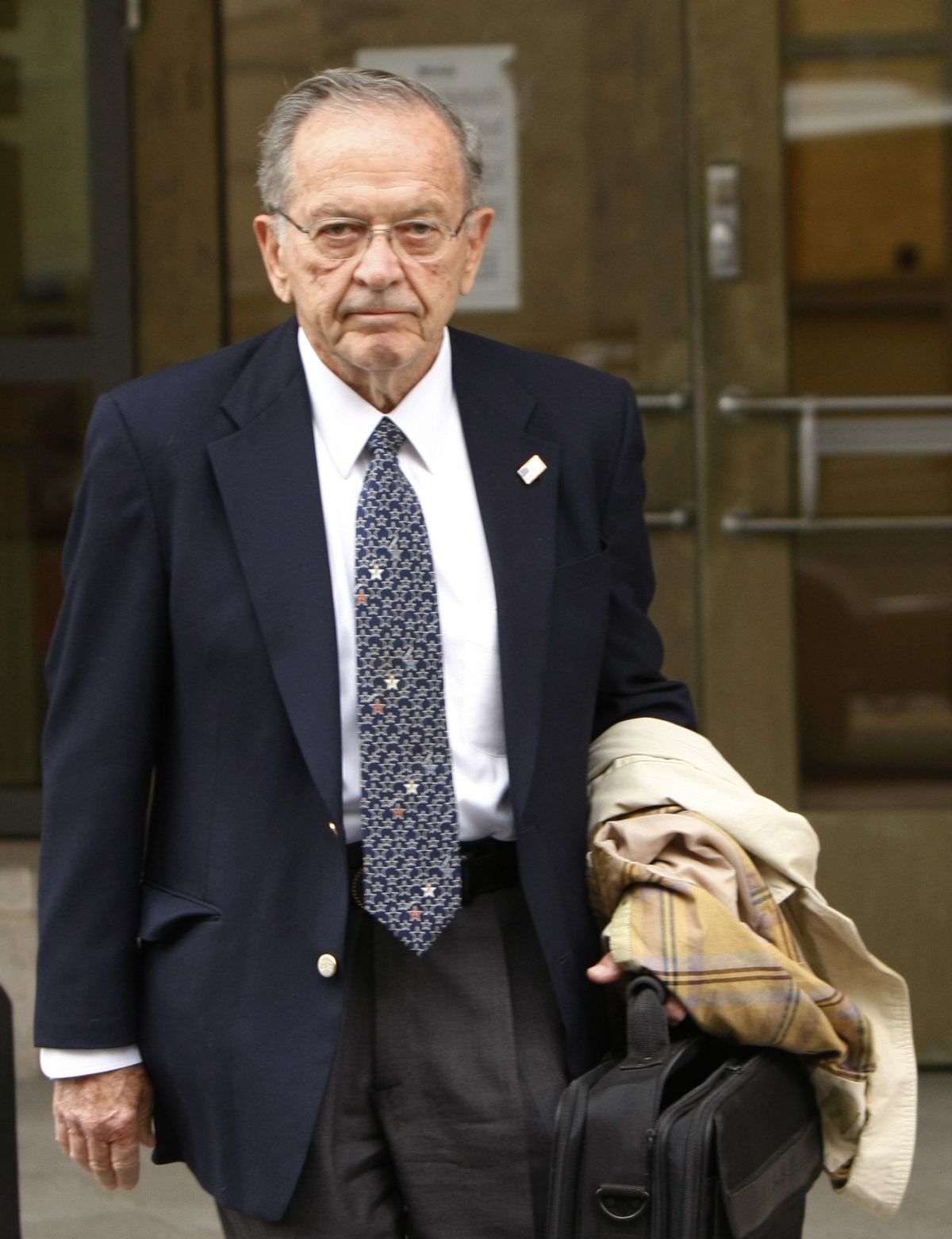Stevens convicted of hiding gifts
Combative senator faces voters next

WASHINGTON – In a stunning verdict that imperils the tenure of the Senate’s longest-serving Republican, a federal jury Monday found Sen. Ted Stevens of Alaska guilty of concealing tens of thousands of dollars in gifts and improvements to his home.
Stevens, 84, reacted pugnaciously, attacking the Justice Department and vowing to continue campaigning for re-election to his seventh term next Tuesday.
“I am obviously disappointed in the verdict but not surprised given the repeated instances of prosecutorial misconduct in this case,” he said in a statement. “I will fight this unjust verdict with every ounce of energy I have.”
He asked Alaskans and his Senate colleagues to “stand with me as I pursue my rights.”
Stevens has managed to remain neck-and-neck with Anchorage Mayor Mark Begich since the trial began, despite being unable to campaign. But political analysts have said from the beginning that all bets would be off were Stevens to be convicted.
The conviction boosts Democrats’ hopes of reaching a filibuster-proof majority in the Senate. Democrats control the Senate 51-49 with the help of two independents but need 60 seats to overcome Republican-led filibusters that have stymied Democratic initiatives.
Senate rules do not automatically bar convicted felons from serving, and it would take a two-thirds vote to expel Stevens if he were re-elected. The chamber has not expelled anyone in more than a century. If Stevens is forced to step down, a special election would be held to determine his replacement.
Some Republicans already appeared to discount the chances that he would return to Washington.
“Ted Stevens served his constituents for over 40 years, and I am disappointed to see his career end in disgrace,” said Sen. John Ensign, R-Nev., who heads the Senate Republicans’ campaign committee. “Senator Stevens had his day in court, and the jury found he violated the public’s trust – as a result he is properly being held accountable. This is a reminder that no one is above the law.”
Alaska Gov. Sarah Palin, Republican vice-presidential nominee, also appeared to distance herself from her home-state lawmaker, using the conviction as an opportunity to trumpet her own anti-corruption credentials.
Palin, who has clashed with Washington’s Republican congressional delegation in the past, said in a statement that the verdict “shines a light on the corrupting influence of the big oil service company that was allowed to control too much of our state. It was part of the culture of corruption that I was elected to fight. And that fight must always move forward, regardless of party or seniority or even past service.”
The verdict was a swift and devastating fall from grace for Stevens, one of the most powerful men in Washington, who once stood third in line to the presidency.
The four-week trial shone a light on Stevens’ relationship with millionaire oilman Bill J. Allen, who once owned the state’s largest private employer and who, with others, plied Stevens with more than $250,000 in gifts and improvements to his home in Alaska.
Allen, who pleaded guilty to federal bribery charges in 2007, was the star witness for the prosecution against Stevens.
Stevens took the stand in his own defense in an attempt to rebut the charges. He took the position that he did not consider the things he got from Allen, including an expensive gas barbecue grill and an elaborate outdoor lighting display, to be gifts but rather unwanted indulgences. As for the home improvement bills, he said that his wife was in charge of that and that she paid every bill she ever received.
But he came across as sour and argumentative on cross-examination, and the verdict indicates the jury did not find him to be a credible witness.
“The last piece of proof that the jurors were left with was a pretty withering cross-examination of Senator Stevens by the government,” said Joshua Berman, a Washington lawyer who once worked in the Justice Department public integrity unit that prosecuted Stevens.
The jury also heard telephone conversations, secretly recorded by the FBI, including one in which Stevens openly discussed the possibility that he and Allen “might have to serve a little time in jail.”
Stevens was convicted on seven counts of making false statements under federal law by failing to disclose the gifts and improvements on his annual Senate financial disclosure form. Each count carries a maximum sentence of up to five years in prison, although he is not expected to get anywhere near that term. Some experts said there was a chance he could get probation, given his age, years of public service and other factors.
He remains free pending sentencing, which is expected to occur sometime early in 2009.
The verdict was reached the same day that a reconstituted jury began deliberations anew after one of the 12 members of the panel was replaced over the weekend because of a family emergency.
Stevens sought “to hide from the public, from his constituents, that he received hundreds of thousands of dollars in freebies,” Matthew Friedrich, acting head of the Justice Department criminal division, said on the courthouse steps after the verdict. He said an investigation into political corruption in Alaska was continuing; among those still believed to be under investigation is Stevens’ son, Ben, a former Alaska lawmaker.